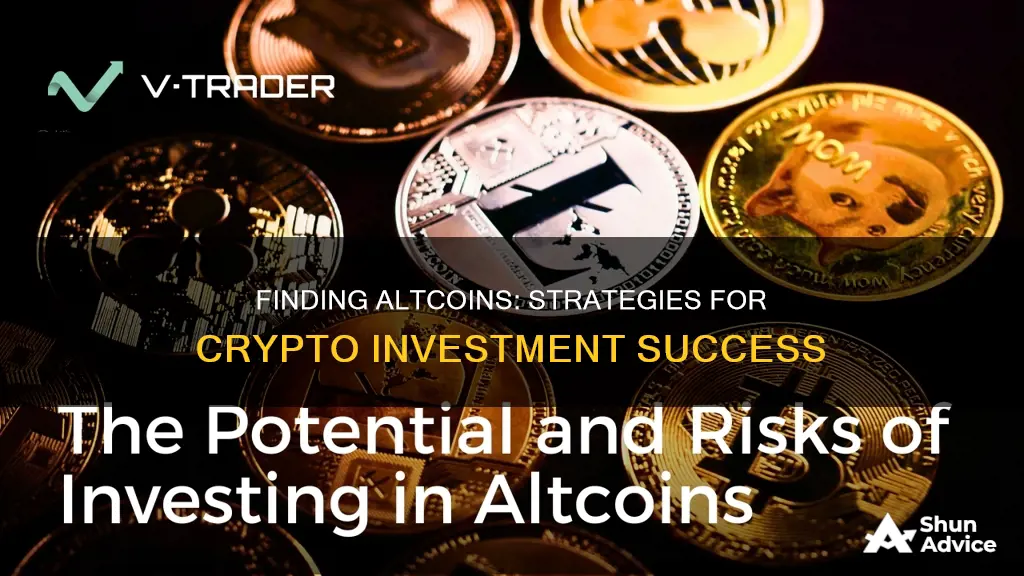
Altcoins are any cryptocurrency that is not Bitcoin, and sometimes not including Ethereum. They are alternatives to Bitcoin, but they may be even riskier investments. Altcoins make up nearly 40% of the total cryptocurrency market, according to CoinMarketCap. There are tens of thousands of altcoins on the market, and the number is constantly growing.
When considering how to find altcoins to invest in, it is important to conduct thorough research. This can include looking at a coin's market cap, use cases, team, and roadmap. It is also crucial to only invest money you can afford to lose, as the cryptocurrency market is highly volatile and unpredictable.
Some popular altcoins include:
- Ethereum (ETH)
- Litecoin (LTC)
- Cardano (ADA)
- Solana (SOL)
- Dogecoin (DOGE)
- Polkadot (DOT)
| Characteristics | Values |
|---|---|
| Definition | All cryptocurrencies other than Bitcoin (and, for some people, Ethereum). |
| Number of altcoins | Over 17,000 |
| Altcoin market share | 40% of the total cryptocurrency market |
| Risk | Riskier than Bitcoin |
| Volatility | Less volatile than Bitcoin |
| Price action | Tends to follow Bitcoin |
| Alt season | Period following a spike in BTC price when altcoins outperform Bitcoin |
| Top altcoins | Ethereum, Tether, Binance Coin, Solana, USD Coin |
| Altcoin categories | Payment tokens, stablecoins, security tokens, utility tokens, meme coins, governance tokens |
| Research | DYOR ("do your own research") |
| Exchange | MEXC, Binance, Coinbase, Crypto.com, Kraken, Gemini |
| Fiat-to-crypto | Credit card, bank transfer |
| Altcoin selection | Market cap, use cases, team, roadmap, white paper, utility, future prospects, underlying technology, community |
| Crypto wallet | Hot wallet, cold wallet |
What You'll Learn

Understand the risks and volatility of altcoins
Before investing in altcoins, it is crucial to understand the associated risks and volatility. While the altcoin market offers high-reward opportunities, it is subject to significant fluctuations and complexities. Here are some essential factors to consider:
Market Volatility
The altcoin market is highly volatile, with prices capable of substantial and rapid changes. This volatility is influenced by various factors, including Bitcoin's dominance, investor sentiment, regulatory developments, and technological advancements. Understanding market cycles and historical price movements can help investors make more informed decisions.
Regulatory Risks
The regulatory framework for cryptocurrencies is still evolving, and the lack of clear and consistent regulations adds an extra layer of risk and uncertainty. Changes in government policies and regulations can significantly impact the market. For example, a ban on cryptocurrencies in a major country can lead to rapid price drops.
Technological Complexity
Altcoins vary significantly in their underlying technology, consensus mechanisms, and functionalities. This diversity demands thorough research and understanding from investors. It is important to assess the technology, development team, economic model, and market potential of an altcoin before investing.
Investment Risk
Investing in altcoins carries a higher risk compared to traditional cryptocurrencies like Bitcoin and Ethereum. The success of an altcoin investment depends on various factors, including the team, use case, market demand, and community support. Due to the large number of altcoins available, investors should be cautious about over-diversification and carefully consider the stability and growth potential of each investment.
Market Manipulation and Schemes
The altcoin market is susceptible to pump-and-dump schemes, where a group of investors artificially inflate the price of an altcoin before selling it off, causing late investors to incur significant losses. It is crucial to remain vigilant and conduct thorough research to avoid falling victim to such schemes.
Low Liquidity
Altcoins with low trading volume and liquidity can be riskier investments. Low liquidity can lead to abrupt price variations and market manipulation. Investors should prioritize altcoins with higher trading volume and liquidity to ensure stability and reliability.
In conclusion, understanding the risks and volatility of altcoins is essential for making informed investment decisions. While the altcoin market offers high-reward opportunities, it is crucial to conduct thorough research, assess the stability and growth potential, and carefully consider the unique characteristics of each altcoin before investing.
FET Coin: A Good Investment Option?
You may want to see also

Research the altcoin's white paper, team and future prospects
Researching Altcoin White Papers, Teams, and Future Prospects
When considering investing in an altcoin, it is important to conduct thorough research. As altcoins are riskier investments than traditional cryptocurrencies like Bitcoin and Ether, it is important to understand the risks and know what you are getting into.
White Papers
An altcoin white paper will give you a comprehensive explanation of the project. It will detail the problem the project is trying to solve and the technical solution it proposes. It will also outline the use of the cryptocurrency, how funds will be raised, and the token allocation.
You can find the white paper of almost every available cryptocurrency. It is worth noting that some altcoins, such as Litecoin, do not release a white paper.
Teams
It is critical to know the credibility and experience of the team behind any crypto project. Research the team's background and how they are making money from the transaction. Ask yourself: do they have the necessary experience to make this project a success?
Future Prospects
When researching an altcoin's future prospects, look for a clear roadmap on the project's website. A roadmap is a planning technique that identifies the short and long-term objectives of a crypto project. It can be a great indicator of future performance, especially if the project has met past objectives.
Look for clear timelines, upcoming major updates, and announcements. Also, consider the total amount of altcoins that will ever be produced and how many are currently in circulation. This will impact the price of a single coin.
Other Considerations
- Market cap: Market capitalisation indicates the stability and growth potential of a cryptocurrency. The rule of thumb is that the higher the market cap, the safer the investment.
- Utility: What is the purpose of this cryptocurrency? Does it solve a real problem or improve on existing technology?
- Underlying technology: How does the cryptocurrency work?
- Use cases: Are there real-world use cases for this cryptocurrency?
- Competition: How does this altcoin compare to its competitors?
- Community: Legitimate cryptocurrencies will likely have a solid community of miners, developers, supporters, and potential users.
Remember, investing in cryptocurrency is risky, so always do your research and only invest money you can afford to lose.
Litecoin Investment: Should You Buy?
You may want to see also

Assess the altcoin's market cap and growth potential
When assessing the market cap and growth potential of altcoins, it's important to understand the overall crypto market. The global crypto market cap is currently valued at around $2 trillion, with Bitcoin (BTC) and Ethereum (ETH) being the biggest players, constituting 56.4% and 14.6% of the market, respectively. Altcoins, which refer to all cryptocurrencies other than Bitcoin, make up about 40% of the total cryptocurrency market, with a market cap of over $180 billion.
Market capitalisation, or market cap, is a crucial indicator of the stability and growth potential of a cryptocurrency. It is calculated by multiplying the current price of a coin by the total number of coins in circulation. Generally, a higher market cap compared to other coins indicates a safer investment. However, it's important to note that market cap is not the sole determinant of investment potential, as other factors such as use cases, team credibility, and future roadmap also play a significant role.
When evaluating altcoins for investment, it's recommended to consider a range of market caps rather than solely focusing on price. This means investing in a combination of high, medium-high, and moderate market cap coins. While low-cap coins (below $20 million market cap) can offer enormous gains, they are also high-risk investments, and you could lose your entire investment.
To identify altcoins with strong growth potential, look for coins with the following characteristics:
- Clear utility: The cryptocurrency should aim to solve a real problem or improve existing technology. For example, Bitcoin addressed the demand for less dependence on financial institutions.
- Strong community: Legitimate cryptocurrencies tend to have a solid community of miners, developers, supporters, and potential users who adopt its use case and validate its legitimacy and popularity.
- Credible team: Research the credibility and experience of the team behind the crypto project.
- Well-defined roadmap: Look for altcoins with clear timelines for development, major updates, and future objectives.
- Competitive advantage: Compare the altcoin's white paper and utility with its competitors. While being first into a user space can be advantageous, it's important to recognise that multiple successful projects can coexist within the same category.
Small Bitcoin Investments: Worth the Risk?
You may want to see also

Compare the altcoin to its competitors
When comparing an altcoin to its competitors, it is important to consider the following factors:
- Market capitalisation: This indicates the stability and growth potential of a cryptocurrency. A higher market cap compared to other coins usually indicates a safer investment.
- Use cases: The purpose of the cryptocurrency and whether it solves a real problem or improves existing technology.
- Future prospects and roadmap: A clear roadmap with short and long-term objectives can be a good indicator of future performance.
- Underlying technology: How the altcoin works and the consensus mechanism it uses, such as Proof of Work, Proof of Stake, or Delegated Proof of Stake.
- Community: Legitimate cryptocurrencies tend to have a solid community of miners, developers, supporters, and potential users.
- Team: The credibility and experience of the team behind the altcoin project.
For example, if you are considering investing in Solana, a blockchain platform with smart contracts, you should compare it to other coins in the same category, such as Ethereum, Cardano, and Cosmos. Check out the competition's white papers, utility, and market dominance. While Bitcoin and Ethereum were the first movers in the space, it is important to understand that multiple projects can coexist and excel in the same category.
The Ultimate Guide to Investing Money in Bitcoin
You may want to see also

Check the altcoin community and its credibility
When considering investing in an altcoin, it is important to assess the credibility of the altcoin community. Legitimate cryptocurrencies tend to have a solid community of miners, developers, supporters, and potential users around them. These communities give value to an altcoin by adopting its use case and validating its legitimacy and popularity.
Digital currencies with strong, active communities are a good sign that there is genuine interest and belief in the coin. It is critical to research the credibility and experience of the team behind any crypto project.
Some key questions to ask when assessing the credibility of an altcoin community include:
- Have the team members worked on other reputable and successful projects in the past?
- What are their credentials?
- Are they reputable members of the crypto community and blockchain ecosystem?
For example, Ethereum has a strong investment community because every individual working on Ethereum-related projects creates value for Ethereum holders. Despite issues such as high fees and slow transactions, developers, community builders, and other top talents still want to be a part of Ethereum. This has created a ripple effect, attracting even more credible forward-thinkers and allowing for more projects and improvements to be built upon the platform.
Therefore, when considering an altcoin investment, thoroughly researching the community and team behind the project is crucial to assess its credibility and potential for success.
The Ultimate Guide to Investing in Coin Market Cap
You may want to see also
Frequently asked questions
Altcoins are any cryptocurrencies that are not Bitcoin (BTC) and, to some people, not Ethereum (ETH) either. They are alternatives to the two global leaders in cryptocurrency.
It's important to conduct thorough research. Look at a coin's market cap, use cases, team, and roadmap.
Popular altcoins include Cardano (ADA), Solana (SOL), Dogecoin (DOGE), and Polkadot (DOT).







